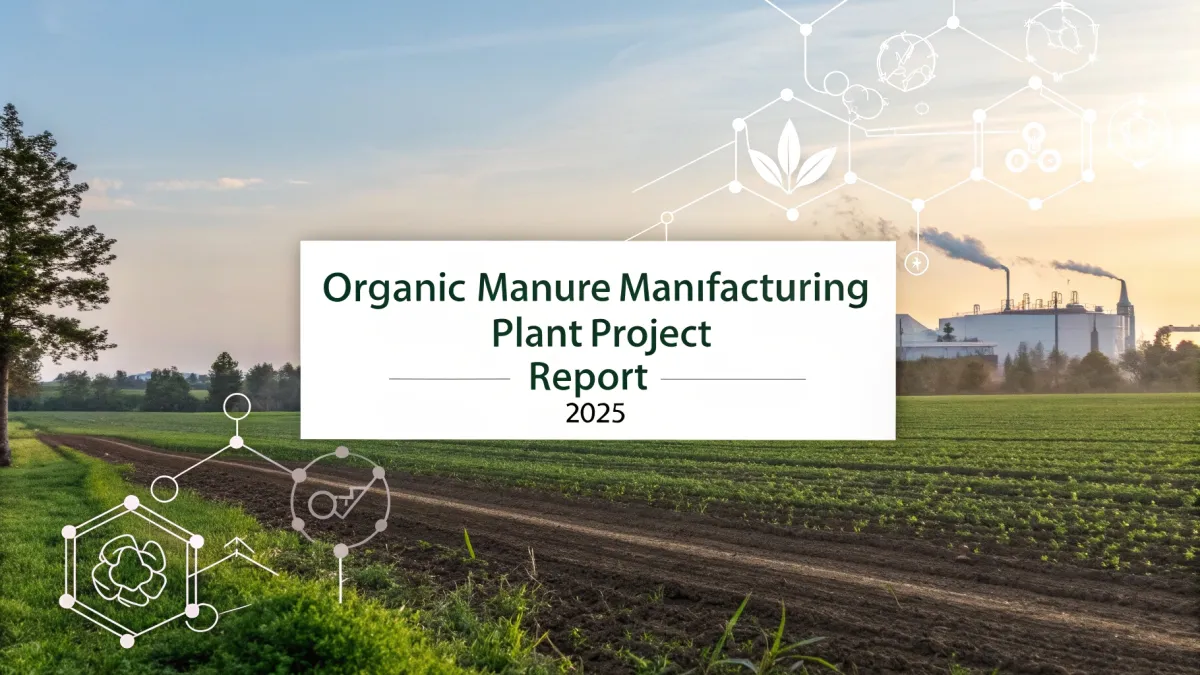
Organic Manure Manufacturing Plant Project Report 2025: Business Plan, Unit Setup Cost, Process Flow And Raw Materials
Setting up an organic manure manufacturing plant requires raw material collection systems, composting units, shredders, mixers, drying equipment, packaging facilities, and quality testing labs. Key considerations include location near raw material sources, compliance with environmental standards, and efficient distribution networks.
IMARC Group's report, titled “ Organic Manure Manufacturing Plant Project Report 2025: Industry Trends, Plant Setup, Machinery, Raw Materials, Investment Opportunities, Cost and Revenue,” provides a complete roadmap for setting up a organic manure manufacturing plant. It covers a comprehensive market overview to micro-level information such as unit operations involved, raw material requirements, utility requirements, infrastructure requirements, machinery and technology requirements, manpower requirements, packaging requirements, transportation requirements, etc.
Request for a Sample Report : https://www.imarcgroup.com/organic-manure-manufacturing-plant-project-report/requestsample
Organic Manure Industry Outlook 2025:
The organic manure industry outlook for 2025 indicates strong growth, driven by rising demand for sustainable agriculture and eco-friendly farming practices. Increasing consumer preference for organic food and government initiatives promoting soil health management are fueling adoption. With growing awareness of the adverse effects of chemical fertilizers, farmers are shifting toward natural alternatives, boosting market expansion. Technological advancements in composting and waste management are improving production efficiency. Although challenges such as raw material collection and standardization persist, the organic manure industry is expected to maintain steady momentum, supporting global efforts toward greener and more sustainable agriculture in 2025.
Key Insights for Organic Manure Manufacturing Plant Setup:
Detailed Process Flow:
-
Product Overview
Unit Operations Involved
Mass Balance and Raw Material Requirements
Quality Assurance Criteria
Technical Tests
Project Details, Requirements and Costs Involved:
-
Land, Location and Site Development
Plant Layout
Machinery Requirements and Costs
Raw Material Requirements and Costs
Packaging Requirements and Costs
Transportation Requirements and Costs
Utility Requirements and Costs
Human Resource Requirements and Costs
Capital Expenditure (CapEx) and Operational Expenditure (OpEx) Analysis:
Project Economics:
-
Capital Investments
Operating Costs
Expenditure Projections
Revenue Projections
Taxation and Depreciation
Profit Projections
Financial Analysis
Profitability Analysis:
-
Total Income
Total Expenditure
Gross Profit
Gross Margin
Net Profit
Net Margin
Key Cost Components of Setting Up a Organic Manure Manufacturing Plant
-
Land & Infrastructure – Space for composting pits, processing units, and storage facilities
Raw Material Procurement – Collection and transportation of animal dung, crop residues, and organic waste
Machinery & Equipment – Shredders, composting units, mixers, dryers, sieving machines, and packaging systems
Labor & Workforce – Skilled and unskilled workers for handling raw materials, operations, and quality testing
Energy & Utilities – Power, water, and fuel required for processing and drying activities
Quality Control & Testing – Laboratories for nutrient analysis, microbial activity testing, and certification
Packaging & Logistics – Costs of eco-friendly packaging, storage, and distribution channels
Regulatory Compliance – Approvals related to waste management, pollution control, and organic certification
Economic Trends Influencing Organic Manure Manufacturing Plant Setup Costs 2025
-
Rising Demand for Organic Farming – Increased adoption of organic agriculture globally
Government Incentives – Subsidies and schemes promoting sustainable farming and waste recycling
Waste Management Policies – Encouragement for converting organic waste into value-added fertilizers
Energy & Transportation Costs – Fluctuations in fuel and power costs impacting production
Export Opportunities – Growing demand in international organic markets increasing profitability
Sustainability Trends – Higher investments in eco-friendly technologies and packaging solutions
Request for Customized Report: https://www.imarcgroup.com/request?type=report&id=19393&flag=E
Challenges and Considerations for Investors in Organic Manure Manufacturing Plant Projects:
-
Raw Material Availability – Seasonal fluctuations in organic waste supply
High Competition – Presence of local and regional small-scale producers
Standardization Issues – Variability in nutrient content and quality of manure
Regulatory Barriers – Compliance with organic certification and environmental norms
Market Awareness – Need to educate farmers on long-term benefits of organic manure
Logistics & Storage – Challenges in maintaining product quality during transportation and storage
Conclusion:
The organic manure industry in 2025 is poised for significant expansion, fueled by the global shift toward sustainable agriculture and increasing demand for organic food production. Establishing an organic manure manufacturing plant offers strong growth potential but requires careful planning around raw material sourcing, regulatory compliance, and quality assurance. While challenges such as competition, standardization, and supply fluctuations persist, supportive government policies and rising farmer awareness are creating favorable conditions for investment.
Investors who adopt efficient processing technologies and build strong distribution networks will be well-positioned to capitalize on the growing organic farming movement worldwide.
About Us:
IMARC Group is a global management consulting firm that helps the world's most ambitious changemakers to create a lasting impact. The company excel in understanding its client's business priorities and delivering tailored solutions that drive meaningful outcomes. We provide a comprehensive suite of market entry and expansion services. Our offerings include thorough market assessment, feasibility studies, company incorporation assistance, factory setup support, regulatory approvals and licensing navigation, branding, marketing and sales strategies, competitive landscape, and benchmarking analyses, pricing and cost research, and procurement research.
Contact Us:
IMARC Group
134 N 4th St. Brooklyn, NY 11249, USA
Email: sales[@]imarcgroup.com
Tel No:(D) +91 120 433 0800
United States: (+1-201971-6302)
Legal Disclaimer:
MENAFN provides the
information “as is” without warranty of any kind. We do not accept
any responsibility or liability for the accuracy, content, images,
videos, licenses, completeness, legality, or reliability of the information
contained in this article. If you have any complaints or copyright
issues related to this article, kindly contact the provider above.

















Comments
No comment